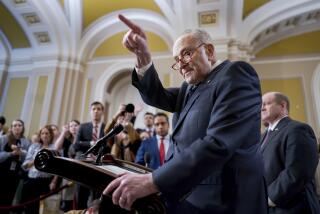Senate Panel OKs U.S.-British Extradition Pact
WASHINGTON — The Senate Foreign Relations Committee on Thursday approved a compromise version of a U.S.-British extradition treaty that would restrict the right of Northern Ireland refugees to fight extradition from the United States by claiming political justification for criminal acts committed in their homeland.
Immediately after the 15-2 vote, the committee unanimously endorsed a $10-million aid program for Northern Ireland. The Administration had proposed such a program as a means of helping to end the continuing civil strife there.
The committee chairman, Sen. Richard G. Lugar (R-Ind.), proposed cutting the $50 million sought by the White House and the $20 million voted by the House to $10 million, saying that “the money isn’t there.”
Opponents of a tougher original treaty text claimed victory in an amendment that would allow U.S. federal courts to consider pleas by defendants who claim that they would not be able to get a fair trial in their homeland.
Reagan Pushed Measure
President Reagan strongly urged passage of the original, more restrictive version of the treaty, both as a symbol of U.S. commitment to fight international terrorism and as a gesture of gratitude toward Britain’s Conservative government for having permitted the United States to use British bases to launch its air attack on Libya in reprisal for Libyan terrorism.
Britain had long sought a new extradition treaty on grounds that the existing agreement made it too easy to raise a political defense and elude extradition. But Robert Andrew Burns, a spokesman at the British Embassy, said, “We welcome the vote and are happy with the text.”
Father Sean McManus, an Irish-born Roman Catholic priest and national director of the Irish National Caucus, earlier opposed the treaty as anti-Irish and said, “It legitimizes English rule and occupation in Ireland.” After the vote, however, he said he was pleased with the amendment permitting defendants to present evidence that they would be unable to obtain a fair trial in Northern Ireland.
Jury Trials Suspended
“I believe it would be easy to prove there is no such thing as a fair trial in Northern Ireland,” McManus said, noting that jury trials have been suspended under the emergency powers act that prevails in Northern Ireland.
Only Sens. Jesse Helms (R-N.C.) and Edward Zorinsky (D-Neb.) opposed the treaty, which came to a vote only after debate reached table-pounding levels at several points during consideration of modifications worked out by Lugar and Sen. Thomas F. Eagleton (D-Mo.).
More to Read
Sign up for Essential California
The most important California stories and recommendations in your inbox every morning.
You may occasionally receive promotional content from the Los Angeles Times.










